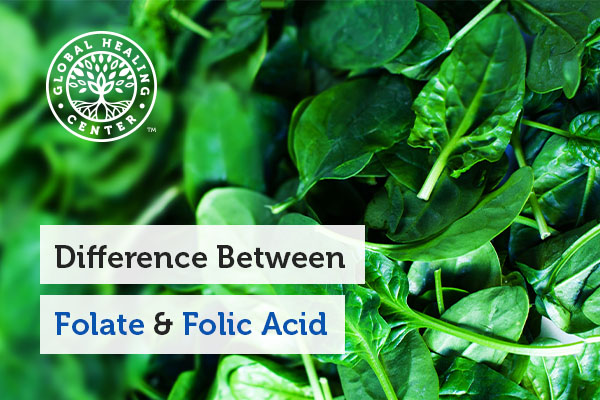
It's a common question — what is the difference between folate and folic acid? Is folate the same as folic acid? It can be confusing because, depending on where you look, the terms are used interchangeably. And, you may also read how important it is to have in your diet, and the benefits associated with it... or them? Let's explore their similarities and differences.
What is Folate and What is Folic Acid?
Folate and folic acid are both forms of vitamin B9. Your body needs vitamin B9 to create and repair DNA. It also promotes cell and tissue growth and is a level of defense against anemia. One compound derived from it, tetrahydrofolate, breaks down harmful homocysteine into beneficial methionine. Methionine promotes cardiovascular and brain health. It's also an important nutrient during early pregnancy. Too little can prompt neural tube defects, which can terminate a pregnancy or cause spina bifida. That’s at least one reason why the US government-mandated folic acid fortification in 1996.
What's the Difference Between Folate and Folic Acid?
The difference between folate and folic acid is that folic acid is a synthetic form of folate. What's the point of a synthetic version? It's easy to add to supplements and food.[1]
Folate occurs naturally and is already densely packed into food like dark green leafy vegetables such as spinach, kale, and collard greens. It's also in beans, almonds, sweet potato, bananas, and other fruits and vegetables.[2] It's a testament to the notion that a natural, plant-based diet is the best diet.
If you're mostly consuming whole foods, you'll get the best nutrients and won't need to rely on a "vitamin fortified" children's cereal.
Synthetic? What are the Concerns?
Compared to folate, folic acid converts to tetrahydrofolate very slowly and is less effective. [3] Also, excess folate is excreted through urine and consuming too much is generally not a concern; folic acid is a little different. Because it takes time to metabolize, it can accumulate in the blood. The unmetabolized folic acid may adversely affect immune cell function and even reduce the effectiveness of some medications. Additionally, high levels of vitamin B9 can hide a vitamin B12 deficiency (if it exists). Although it's not exactly an example of causation, a study of 1,800 elderly patients did find that those with the highest levels of unmetabolized folic acid suffer the effects of B12 deficiency. [4]
Which Do You Prefer?
What do you get the most of in your own life? Do you eat a lot of foods rich in folate, or do you rely on a multivitamin for folic acid? Have you noticed any differences between the two?
References (4)
- Alison Evert, MS, RD, CDE, David Zieve, MD, MHA, David R. Eltz, Stephanie Slon, and Nissi Wang. Folic acid in diet. MedlinePlus Fact Sheet. (last accessed 2014-04-05)
- KwaZulu-Natal Dietitians : Department of Health. Foods rich in folic acid and vitamin B12. (last accessed 2014-04-05)
- Bailey SW, Ayling JE. The extremely slow and variable activity of dihydrofolate reductase in human liver and its implications for high folic acid intake. Proc Natl Acad Sci U S A. 2009 Sep 8;106(36):15424-9. doi: 10.1073/pnas.0902072106.
- Morris MS, Jacques PF, Rosenberg IH, Selhub J. Circulating unmetabolized folic acid and 5-methyltetrahydrofolate in relation to anemia, macrocytosis, and cognitive test performance in American seniors. Am J Clin Nutr. 2010 Jun;91(6):1733-44. doi: 10.3945/ajcn.2009.28671.
†Results may vary. Information and statements made are for education purposes and are not intended to replace the advice of your doctor. If you have a severe medical condition or health concern, see your physician.







